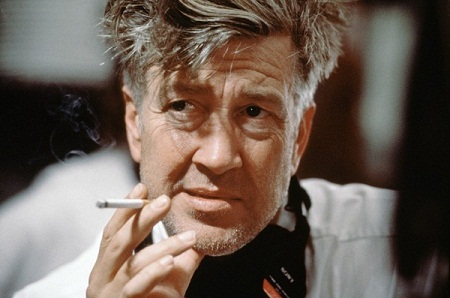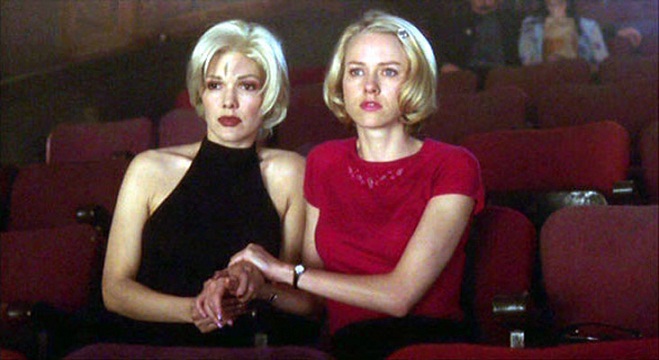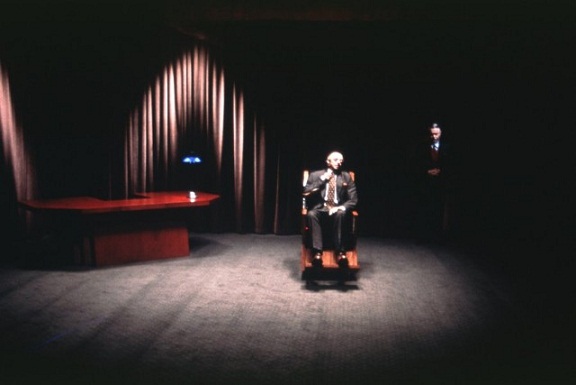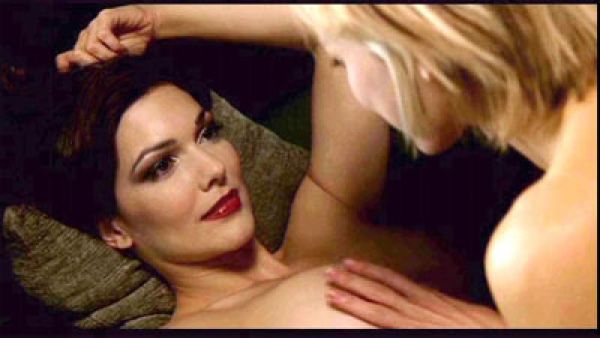On June 22, 2011, Matty "Ballgame" Robinson and Adam Kempenaar, co-hosts of the essential "Filmspotting" podcast/radio show, convened the third session of the summer class they're teaching, "Hollywood Reflected: Movies About Movies". We watched "Mulholland Drive," on many days my favorite film. I certainly never get tired of watching it.

The whole class is about movies that are meta--that is, that are about movies on some level--but rarely has a mirror quite like "Mulholland Drive" been held up to the dream factory. It's a fun house mirror, or maybe a deep dark truthful one, to paraphrase my man Elvis Costello.
[Warning: spoilers coming!]
As many times as I've seen it, watching it in class was a new experience because I had the themes and images from our first two classes richocheting around in my head (not unlike the way all those Hollywood dreams and detritus filter through aspiring starlet Naomi Watts' consciousness in the first two-thirds of "Mulholland Drive", in those last guilty fever-dream moments before she shoots herself).
In our first two sessions we'd examined The Star. Matty and Adam discussed "cautionary tales," movies meant to warn girls how strong the chances were against them if they followed their dreams to Hollywood. To illustrate they showed excerpts from a Mack Sennett silent with Mabel Normand, "The Extra Girl", including a scene where Normand's character does a comic screen test. Adam explained that there's a whole tradition of such scenes, and illustrated with a screen-test scene from "The Star" from 1952 with Bette Davis.
Then we watched the 1937 version of "A Star is Born" (with Janet Gaynor, making the transition from silents like "Sunrise" (sigh)).

In the second class, expanding on the theme "I'm going out there and BE somebody," they showed "Singin' in the Rain", another picture I can always watch with pleasure.
All of this made for an expertly selected set-up for "Mulholland Drive". Every facet of what Adam and Matty had been talking about is there in Lynch's picture: success, illusion, identity shifts, the movie business, the way Hollywood chews up and spits out starlets...The Dream. And it's genius, the way it limns all of that through symbols, colors, codes, feelings, and an endlessly layered storehouse of movie references.

In a fun move, Adam framed the post-film discussion using the deliberately abstruse "10 Clues" that Lynch issued in the wake of the movie's release. Did talent alone help Camilla [become a movie star]? Where is Aunt Ruth? (Well, dead--or, in Hollywood parlance, "acting in Canada".)
On the one hand they'd placed the movie within a tradition: I think of Naomi Watts' audition scene, which must stand as the absolute pinnacle of screen-test-type scenes. Or of Jean Hagen fleeing the microphone in "Singin'" and the song carrying on without her, just as the soaring, heartbreaking Spanish version of Roy Orbison's "Crying" fills the Silencio club even after the singer collapses. It's all an illusion.

But they'd also shown us how it takes that tradition to places it never dared go before. The movie emerges as the ultimate movie about Hollywood, the ultimate cautionary tale, but the warning it sounds aims right at us, the dream-consumers. Hollywood is bogus. "Hey pretty girl, time to wake up."
And then there's also this.

Funny, as deep into as we got in the ensuing lively discussion, I still feel like we barely scratched the surface.